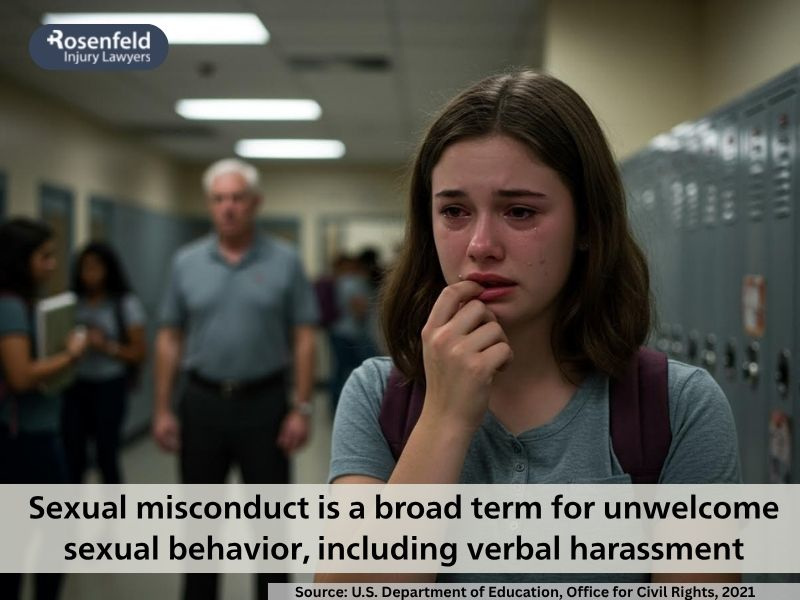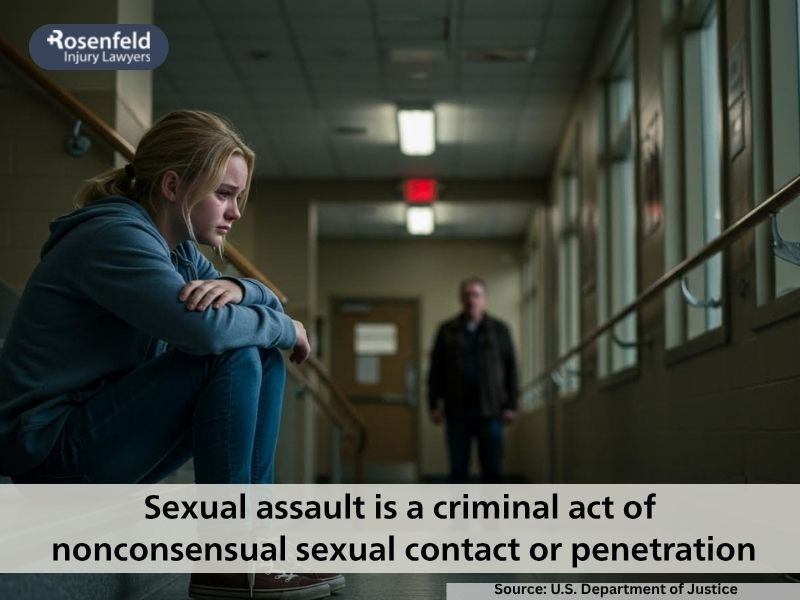What’s the Difference Between Sexual Misconduct vs Sexual Assault?
Sexual behaviors in inappropriate settings can have serious consequences for the victim. Their physical, emotional, and financial well-being may be damaged because of the perpetrator’s actions. In the legal field, distinguishing various sexual behaviors is important, such as sexual misconduct vs sexual assault. Although these terms are used interchangeably, they are handled differently by the courts.
Sexual misconduct is a broad term that refers to unwanted or inappropriate behavior that violates professional, ethical, or institutional standards. It does not always rise to criminal charges. Sexual assault involves non-consensual sexual activity or contact that is recognized as a crime under state or federal laws.
Sexual misconduct often precedes or coincides with sexual assault, but both categories require accountability for the perpetrator. If you are a survivor of sexual misconduct, you can pursue compensation for legal damages suffered. Injury Lawyer Team will stand by your side throughout the claims process to protect your rights and fight for a favorable settlement.

What Is Sexual Misconduct?
Sexual misconduct is a broader term that can include harassment, grooming, coercion, and exploitation by those in positions of trust or power. Here are some examples of unwanted sexual behavior that could lead to a lawsuit:
- Inappropriate touching, comments, or advances
- Abuse of authority by teachers, coaches, doctors, clergy, or supervisors
- Sending explicit messages or photos to a subordinate or student
- Retaliating against another person who refuses sexual advances
Although not all forms of sexual misconduct meet the definition of a crime, these behaviors can violate Title IX, employment laws, or professional ethics codes. Plaintiffs can seek compensation for emotional distress, career loss, or institutional negligence.
What Is Considered Sexual Assault?
Sexual assault is any unwanted sexual contact, penetration, or act committed when the victim did not give consent, and is considered a criminal offense under both state and federal laws (such as federal code 18 U.S.C. §2241–2244).
Examples of sexual assault include:
- Rape or attempted rape
- Fondling or groping when the victim did not give consent
- Sex acts involving minors or incapacitated persons
The absence of consent makes any sexual act an assault, and sexual assault occurs in schools, workplaces, prisons, care facilities, and even personal relationships.
How Does Sexual Misconduct Relate to Sexual Abuse?
Sexual abuse is an even broader term that can include both sexual misconduct and sexual assault. Power imbalances and repeated patterns are often involved in abusive behavior, which can occur in:
- Institutions (schools, churches, nursing homes, hospitals)
- Domestic environments (family members, guardians, partners)
- Professional relationships (doctors, therapists, educators)
Abuse may combine examples of sexual misconduct (grooming or coercion) with sexual assault (physical contact or penetration). Some examples include the abuse of a child or institutional liability for a company ignoring red flags and allowing abuse.
What Is the Difference Between Sexual Assault and Domestic Violence?
Domestic violence is a pattern of physical, emotional, or sexual abuse within a household or intimate relationship. This can take the form of sexual misconduct or sexual assault when it involves marital rape, sexual coercion, or threats of harm. Survivors of violence may experience financial abuse, isolation, or psychological manipulation.
This type of violence is recognized as a civil and criminal issue. Victims may seek restraining orders, protective custody, or fair compensation through legal processes. If the police, social services, or other institutions fail to intervene amid complaints of violence, the victim could sue these entities for willful misconduct or gross negligence.
Although you may feel trapped as a survivor due to shame or fear, our attorneys will provide a compassionate space to hear your story. We believe abuse is NEVER the fault of the victim.
What Is the Difference Between Sexual Misconduct and Dating Violence?
Dating violence can affect everyone, regardless of sexual orientation or gender identity.
It occurs between people in romantic relationships and may involve sexual misconduct, sexual assault, physical violence, or psychological control. Some elements that may be present in these circumstances include lack of consent, coercion, power dynamics, emotional manipulation, unwanted sexual activities, and digital harassment.
Victims should understand how certain laws protect them, such as the Violence Against Women Act or Title IX (for victims of intimate violence in schools and colleges).
A survivor has several legal options after suffering sexual assault or sexual misconduct in this context, such as seeking a protective order or filing a civil lawsuit for legal damages. This is especially true if the abuser is a school employee, roommate, or coach.
What Are the Legal Consequences of Sexual Misconduct or Sexual Assault?
Sexual assault and sexual misconduct can have serious consequences for the perpetrator. As a victim, you could pursue civil action even if the perpetrator is charged with a criminal offense. These legal processes are governed by individual statutes of limitations in each state, which determine how long victims have to pursue action.
Let’s discuss the various consequences the at-fault party may face:
- Criminal – imprisonment, sex offender registration, and probation (a doctor facing prison for sexual assault)
- Civil – compensation for medical bills, therapy, and emotional harm (a clergy member facing lawsuits and prosecution for child abuse)
- Administrative – job loss, license revocation, or recertification requirements (a teacher losing certification for misconduct)

What Damages Can Survivors Recover in a Civil Lawsuit?
These types of settlements are often confidential, but public suits can promote reform and hold individuals and institutions accountable. The value of a case depends on injury severity, jurisdiction, and the nature of the sex act.
Legal damages can include:
Economic
- Lost wages
- Medical expenses
- Future medical bills
Non-Economic
- Emotional distress
- Pain and suffering
- Loss of trust
Punitive
In cases of willful or repeated misconduct, the victim may qualify for additional compensation.
How Injury Lawyer Team Can Help
Whether your case involved sexual assault, sexual misconduct, or another form of abuse, Injury Lawyer Team will guide you through the legal process. You are not alone in this fight, and our team has experience holding individuals and institutions accountable.
Our sexual assault and misconduct lawyers work on a contingency fee basis, which means you owe nothing unless we win. You can ask questions about sexual battery, unwanted physical contact, and the difference between sexual misconduct and sexual assault during a free consultation.
Contact us today at 866-757-6452 to schedule your no-obligation case evaluation.
All content undergoes thorough legal review by experienced attorneys, including Jonathan Rosenfeld. With 25 years of experience in personal injury law and over 100 years of combined legal expertise within our team, we ensure that every article is legally accurate, compliant, and reflects current legal standards.








